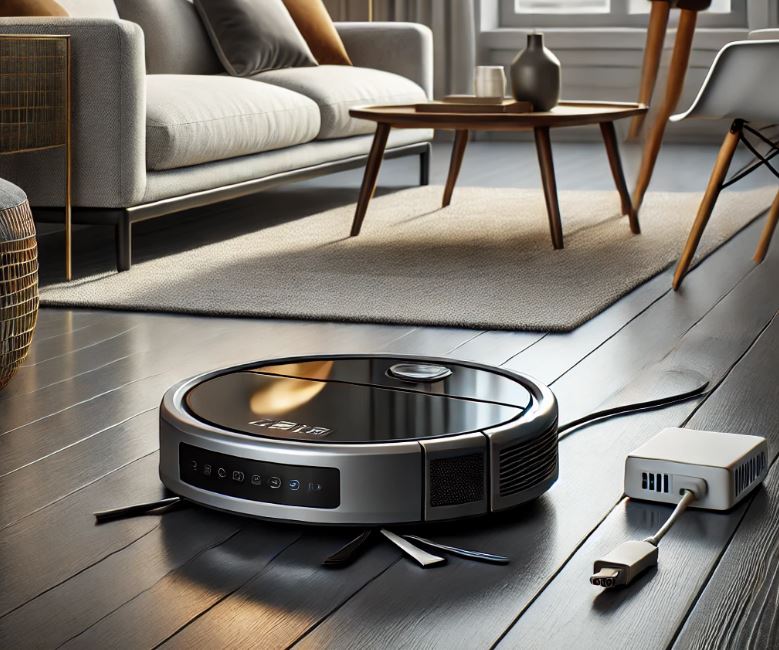I'm a participant in the Amazon Services LLC Associates Program, an affiliate advertising program designed to provide a means for me to earn fees by linking to Amazon.com and affiliated sites.
As technology continues to evolve, robot vacuums have become a staple in many households, offering convenience and efficiency in maintaining a clean home. However, one question that often arises is: How much power does a robot vacuum use? Understanding the power consumption of these devices can help you make informed decisions about energy use and cost.
Need help finding the best cheap robot vacuum as well? Our guide will help you out.
Key Takeaways
- Energy Consumption: Robot vacuums generally use between 30 to 90 watts of power per hour.
- Cost Efficiency: The cost to operate a robot vacuum is relatively low, often just a few cents per hour.
- Environmental Impact: Understanding power usage helps in assessing the environmental footprint of your household appliances.
Understanding Robot Vacuum Power Consumption
Average Power Usage
Robot vacuums typically consume between 30 to 90 watts of power per hour during operation. The exact amount of power used depends on several factors, including the model, features, and the cleaning mode in use. For example, a basic model may use around 30 watts, while more advanced models with features like powerful suction and Wi-Fi connectivity may use up to 90 watts.
Energy Cost Calculation
To calculate the energy cost of using a robot vacuum, you can use the following formula:
Energy Cost=Power (kW)×Usage Time (hours)×Cost per kWh\text{Energy Cost} = \text{Power (kW)} \times \text{Usage Time (hours)} \times \text{Cost per kWh}Energy Cost=Power (kW)×Usage Time (hours)×Cost per kWh
Assuming an average usage time of 1 hour per day and an energy cost of $0.12 per kWh:
- For a 30-watt robot vacuum: 0.03 kW×1 hour×$0.12=$0.0036 per hour0.03 \text{ kW} \times 1 \text{ hour} \times \$0.12 = \$0.0036 \text{ per hour}0.03 kW×1 hour×$0.12=$0.0036 per hour
- For a 90-watt robot vacuum: 0.09 kW×1 hour×$0.12=$0.0108 per hour0.09 \text{ kW} \times 1 \text{ hour} \times \$0.12 = \$0.0108 \text{ per hour}0.09 kW×1 hour×$0.12=$0.0108 per hour
This calculation shows that operating a robot vacuum is cost-effective, typically costing only a few cents per hour.
Battery Life and Efficiency
Most robot vacuums are equipped with lithium-ion batteries, which are known for their efficiency and longevity. The battery capacity usually ranges from 2000 to 5200 mAh, allowing the vacuum to run for 60 to 200 minutes on a single charge. Efficient energy usage and optimized battery management systems help in maximizing the vacuum’s cleaning performance while minimizing power consumption.
Recent Developments in the Field
The robot vacuum industry is continually advancing, with recent developments focusing on improving energy efficiency and cleaning performance. Manufacturers are integrating more powerful processors and AI technology to enhance navigation and reduce power consumption. Additionally, the trend towards eco-friendly designs and energy-efficient components is becoming more prevalent.
One notable innovation is the use of smart charging technology, which ensures the vacuum only charges as much as needed, thereby reducing energy waste. For instance, models like the Roborock S6 MaxV utilize advanced algorithms to optimize power usage during cleaning cycles.
Top Experts and Entities in the Field
Industry experts like Shane Daugherty from CNET and John Velasco of Digital Trends provide valuable insights into the latest trends and technologies in the robot vacuum market. Leading entities such as iRobot and Xiaomi are at the forefront of innovation, continuously pushing the boundaries of what robot vacuums can achieve.
For detailed comparisons and expert reviews, websites like Digital Trends and CNET are excellent resources. These platforms offer comprehensive guides and reviews that can help you stay updated on the newest advancements and best practices.
Conclusion – How Much Power Does a Robot Vacuum Use
Understanding how much power a robot vacuum uses can help you make more informed decisions about your household energy consumption. With advancements in technology and an increasing focus on energy efficiency, robot vacuums continue to offer convenient and cost-effective solutions for maintaining a clean home. For more information on selecting the best vacuum for your needs, check out our articles on the Best Vacuum for Hardwood Floors and the Best Vacuum for Stairs.
Author
Vacuums Pal
Vacuums Pal is a leading expert in the field of vacuum technology, providing comprehensive reviews and insights for many years.
Internal Links for Further Reading
For more information on selecting the best vacuum for your specific needs, check out these articles:
